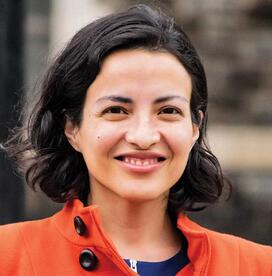Q&A: Pre-read Author Jennifer M. Morton ’02 on Navigating College

This year’s Princeton Pre-read, Jennifer M. Morton ’02’s Moving Up Without Losing Your Way: The Ethical Costs of Upward Mobility, explores the challenges of college for first-generation and low-income students, or “strivers,” as Morton calls them. She spoke to PAW about the messages she hopes students take away from the book and her advice for navigating in a new environment.
What was your reaction to finding out Moving Up Without Losing Your Way was the Pre-read for the Class of 2025?
I was shocked. Thinking about having been a first-year student at Princeton, and the fact that my book would land in the hands of students like me, it was very exciting and surprising. I was really glad that more students would get their hands on the book, and faculty and others at Princeton who are thinking hard about how to support and welcome first-generation and low-income students.
What do you hope students who identify as “strivers” take away from reading the book?
I hope that strivers are accepting of the fact that they often are put into difficult situations, where there’s no choice that is completely reflective of who they are and what they stand for. I hope that this book helps them articulate the uncomfortable sense of being in this space, caught between these two worlds, but that there is also a lot of knowledge and power that comes from that understanding. I also hope it helps them to think about how they can make things better for future strivers, so they don’t have to make these same difficult choices.
What about students who are not strivers?
First is an awareness that there are students on campus who have grown up with different experiences and for whom being at Princeton is not necessarily going to be as easy and wonderful as it is for them. The other thing is that there is something to be gained from being in environments in which you’re challenged. There’s growth that happens from putting yourself in social situations where you might be uncomfortable. If you’re only moving through spaces in which you feel completely comfortable socially and culturally, you’re probably missing out on something that you could learn from being in a space where that’s not the case.
What advice would you offer students who are trying to find the balance between being authentic and navigating code-switching, where individuals act differently to blend into different social contexts?
When you’re in this very intense social environment, it can become really hard to figure out whether something feels off or there’s something about the social norm that is wrong. I think it’s helpful for students to investigate the source of that discomfort and figure out what sorts of values are at stake. For me, I will not put up with people saying racist or sexist things, and I’m going to push back on that. There may be other situations where I decide to go along with what’s happening. I think being reflective and aware is key.
Interview conducted and condensed by C.S.











No responses yet